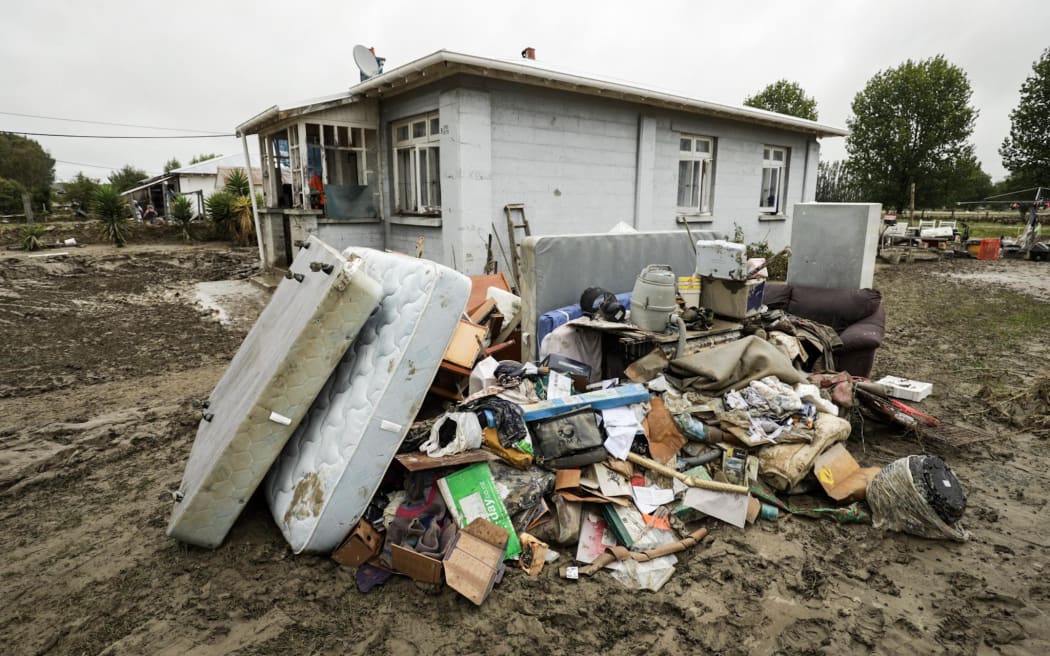For households feeling the cost of living pinch, forking out for pricey home and contents policies is becoming harder to justify. But with devastating climate-induced disasters on the rise, can we afford to not afford insurance?

A damaged house in Wairoa Photo: Nathan McKinnon
Six months after the multi-billion-dollar devastation wrought by Cyclone Gabrielle and the Auckland anniversary weekend floods, there's another storm brewing.
If insurance gets too expensive for most households to afford, and another big disaster strikes, who's going to foot the bill?
Stuff money editor Susan Edmunds tells The Detail budgeting services across the country are starting to hear about families sacrificing their insurance policies as a way to keep a handle on their monthly bills.
The pains of record high rent, mortgage and grocery prices are well known, but the cost of insurance has also been bubbling up.
"Premiums are going up a lot, about 20 percent on average year-on-year, but we've seen some insurers talk about 30 percent," says Edmunds.
"It's a lot to squeeze into a probably similar amount of [income]."
Edmunds says often people underestimate how much it would cost to replace their possessions out of pocket. And even though the horrors of Cyclone Gabrielle, which left thousands of people displaced from their homes, are still fresh, people can be reluctant to think about the worst happening.
"People don't want to engage with the prospect of losing all their stuff. It's something that becomes too hard for people to contemplate."
Edmunds says if people did start pulling back from insurance, especially those in low-risk areas who feel they don't need it, it would most likely make insurance a lot more expensive for people living in high-risk areas.
New Zealand is lucky on a global scale to have a high level of 'insurance penetration', meaning most people are insured, says associate professor Chris Nicoll, an expert in insurance law at the University of Auckland.
Through the government's natural disaster relief scheme, EQC, we also cross-subsidise one another: a person living in Wellington, at elevated risk of loss from a future severe earthquake on the Alpine Fault, pays the same amount to EQC as a person in Auckland does.
Nicoll tells The Detail about the origins of New Zealand's EQC system, which was founded in 1945 on the "philosophical principle of solidarity".
But EQC only covers the traditional 'acts of god' like quakes, volcanoes and tsunami – damage to homes from freak floods or storms, like Cyclone Gabrielle or the Auckland floods isn't covered.
"As things are getting more and more difficult with climate change-induced hazards, it's getting more and more difficult for insurance to cover those particular events," says Nicoll.
People who live in flood-prone areas, or those threatened by coastal erosion and landslips, will likely find insuring their homes becomes prohibitively expensive as insurers turn to risk-based pricing.
"It's going to discriminate against people who find themselves in vulnerable situations without necessarily any fault of their own... I call them 'the incumbents'. They're in a situation that didn't exist 10 to 15 years ago, and they're going to be very badly affected."
He says currently people lack certainty over what type of event will be covered, and by who: private insurers, local councils, or central government.
Thousands of people are still in limbo awaiting decisions on whether councils will buy out their flood-damaged houses.
"At the moment, what we've got is an ad hoc, knee-jerk reaction. You've got a major disaster like we've had recently, and you've got the government coming in and spending large sums of money to help people out.
"There's a moral hazard issue there... If you know that someone is going to come in and help you like that, then you're not likely to take precautions and do forward planning as much as you do otherwise."
Nicoll says a bipartisan approach is urgently needed in parliament to decide what types of events will and won't be covered by EQC in future.
"I've heard people talking about, 'Well, they've bought so many houses in Christchurch, and they paid 100 percent... What are they going to do now?' That's a dangerous precedent."
Hear more discussion about who should take on risk in a high-risk climate future by listening to the full episode.
Check out how to listen to and follow The Detail here.
You can also stay up-to-date by liking us on Facebook or following us on Twitter.

Photo:



